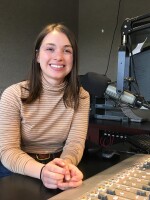Park City community members participated in the second—and final—large-scale event in Park City’s 2020 visioning process Tuesday evening.
An estimated 150 Park City community members—people who live or work in and around Park City—met to discuss the results of more than six months of surveys and meetings around Park City’s future. Park City embarked on its 2020 visioning process in July 2019, 10 years after its last visioning efforts.
Almost 1,000 people have taken the survey, and around 700 have participated in think tanks, large events and smaller meetings. The visioning data show most community members believe, if Park City continues the same path, it will become “Amusement Park City,” where over tourism has drained the town of its character. Their preferred future would “embrace bold change.” While people may disagree on how and when to achieve that bold change, David Beurle, the project consultant from Future I.Q., says there’s a high level of agreement that it needs to happen.
“We have to act on these; we have to act on things with urgency," Beurle said. "People are seeing that being bold is what’s needed, not necessarily that that’s what we want, but we need to be bold. Otherwise, we’re going to lose too much of what we see is important to the character of Park City.”
Participants at the Future Summit learned about six “strategic pillars,” or focal points to move Park City toward bold change: environmental leadership; regional synergy; transportation innovation; sustainable tourism; arts, culture and local economy; and affordability and equity. One participant expressed concern about the impact of Park City’s current trajectory.
“I just know so many people who are leaving," they said. "They’re just gone. They’re gone from my life because they can’t stay here. They can’t afford it.”
Attendees were polled on potential solutions within the strategic pillars, such as becoming a zero-waste town, making Main Street car-free and investing in regional transportation and housing solutions. Most seemed to support moving quickly to implement these policies and investing more resources in them—70% said they would pay more property taxes for regional solutions. But one participant pointed out the sample size and data set in the room might not be representative of Park City as a whole.
“Everybody’s only here tonight, took time out of their schedule to come, because they’re concerned," the participant said. "But there are thousands of people out there who we didn’t sample, whose opinion we need to somehow obtain.”
Park City Mayor Andy Beerman responded by saying local government is governed by those who show up, but the visioning data show many different focus groups—business, environmental, equity—shared similar ideas. Beerman says, though, this is only the beginning.
“The next steps from here is we’ve got to take all this information, synthesize it and figure out what the action plans are," Beerman said. "Then all those action plans have costs. They have consequences, and that’s going to be the broader community conversation, and I hope people still continue to come out, and we hear from some new voices then, too.”
The Park City Council will discuss the strategic pillars at their retreat this week. The city will present the results and an action plan to the community at the State of Park City address on March 3.





